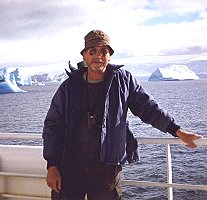 Click to enlarge This is one of the pictures on the roll of photographs found in his cabin after his death | Bert van Stekelenburg Professor of Latin and Watcher of Birds The loss at sea of Bert van Stekelenburg, former Chair of the Department of Latin at Stellenbosch University came as a great shock to the South African Classics community and to his many friends in Stellenbosch, Cape Town, and virtually every other corner of the globe. He fell overboard on 11 March 2003 about four nautical miles off the coast of Chile from the ship with which he was returning to Patagonia from an expedition to watch a particular species of penguin in its own habitat. Colleagues and friends miss Bert for his warmth, his sense of humour, and his consistent self-irony (an ostensible pose of being a 'bombastic Hollander' hid true humility and deep kindness). Extracts from Redevoeringen bij Cassius Dio |
 Bert van Stekelenburg Bert van Stekelenburg1940 - 2003 Author and editor of works on ancient history and literature Albert Victor (Bert) van Stekelenburg was born on 31 March 1940 in Eindhoven,
the Netherlands.
Redevoeringen bij Cassius Dio, Delftsche Uijgevers Maatschappy, 1971 Tria Saecula series (Co-authors: Frans Smuts and Suretha Bruwer), Stellenbosch, 1980-1982 (tri-lingual annotated Latin texts for school and university use) Lexis Latina, Pretoria, 1985 (a basic 1500-word Latin vocabulary, featuring high-frequency word lists suitable for both literary and legal Latin studies) De Iure (editor), Pretoria 1991 (a set of legal Latin texts for law students) |